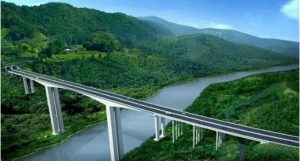About the Traffic Noise
Traffic noise is the noise pollution caused by the sharp increase of the number of motor vehicles in the process of urban traffic developing towards high-grade, high-speed, elevated and three-dimensional modernization. Road traffic noise has the characteristics of high intensity and wide influence range. It has gradually become the main pollution source of urban environmental noise and the difficulty of environmental noise control.
How is the Traffic Noise Generated
The traffic noise is mainly composed of two parts, one is the noise generated by the vibration of the automobile engine and body, and the other is the noise generated by the interaction between the tire and the road surface. There are two sources of the noise generated by the interaction between the tire and the road surface: friction noise and air popping noise. The noise difference between asphalt pavement and cement pavement mainly comes from the popping sound. When the tire is in contact with the road surface, the air that cannot be discharged is compressed. After the tire passes, the pressure decreases instantaneously, and the compressed air is released rapidly, which will produce a popping sound.
Under normal driving conditions, ordinary automobile tires account for 80% of automobile noise, while large truck tires account for about 70%. When the vehicle speed exceeds 40km / h, tire road noise becomes the main noise source.
Noise Comparison between Asphalt and Cement Pavement

Currently, the newly-built pavement is mainly asphalt pavement. Asphalt pavement construction requires a large amount of asphalt, which needs to use special asphalt mixing equipment – asphalt plant. ( For related information, visit the dedicated website. You can directly browse the related link how the asphalt mixing plants work to learn the asphalt production process. ) Compared with the cement pavement in the past, many friends will have a personal feeling, that is, when the car runs on the asphalt pavement, the road noise will be significantly reduced. Why? The author tells you here that the noise of asphalt pavement is lower than that of cement pavement, which is mainly determined by the flexible structure and pore structure of asphalt pavement and the joint structure of cement pavement.
Noise reduction principle of Asphalt Pavement
The flexibility of asphalt pavement is better than that of cement pavement. It is obvious that the vibration caused by flexible pavement under wheel load is small and noise is reduced.
The asphalt pavement has a large number of pores, which makes the asphalt pavement similar to the sponge structure, resulting in A: the tread pavement vacuum acted by the tire can be quickly filled by the gas in the pores, and the vacuum pressure decreases and the popping sound decreases; B: the tread pavement acoustic wave propagates, reflects and vibrates in the sponge structure, converting the acoustic energy into thermal energy, further reducing the noise, which is similar to the noise reduction principle of sound insulation boards and thick snow layers.
In fact, the porous asphalt pavement currently studied has not only excellent drainage and insulation functions, but also good noise reduction functions. In the study, the porosity, pore distribution and pore diameter of porous asphalt pavement were optimized. Compared with the general asphalt pavement with a porosity of 4%, the porosity of porous asphalt pavement can reach 15% ~ 20%, which makes the energy consumption of sound waves in the pores reach the highest, reducing at least 6 ~ 7dB compared with cement pavement and 3 ~ 4dB compared with general asphalt pavement.
For the concrete pavement itself, in addition to the contribution of its rigid structure to the noise, the joints set due to its volume deformation characteristics can also cause strong vibration when vehicles pass through, resulting in noise. At present, the main measure is to increase the joint spacing. For example, the joint spacing of ordinary cement concrete panels is generally 4 ~ 6m, that of roller compacted concrete and steel fiber concrete is generally 6 ~ 10m, and that of reinforced concrete is generally 6 ~ 15m. The extension of the spacing can greatly reduce noise pollution. However, due to the poor connectivity of the pores on the surface of the cement pavement, the popping sound is relatively large.
To sum up, under the same conditions (vehicle vibration noise and pavement flatness are equivalent), the noise of asphalt pavement ( The development of asphalt pavement promotes the progress of reclaimed asphalt hot mix technology and further drives the application of recycled asphalt plants ) is less than that of cement pavement. In addition to its magical effect in noise reduction, asphalt pavement also has great advantages in environmental protection, energy conservation and maintenance. Therefore, asphalt will play an increasingly important role in future road construction.
